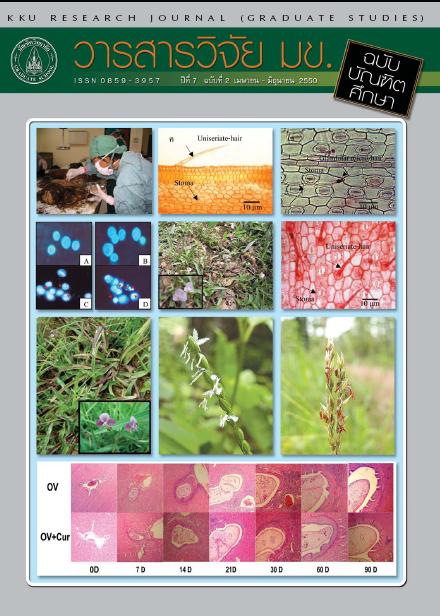A Development Indicators of the Quality for Master of Education Degree of Thesis(การพัฒนาตัวบ่งชี้คุณภาพวิทยานิพนธ์ระดับมหาบัณฑิตทางการศึกษา)
Keywords:
Thesis quality(คุณภาพวิทยานิพนธ์), Indicators of thesis quality(ตัวบ่งชี้คุณภาพวิทยานิพนธ์), Developing indicators of the quality of thesis(การพัฒนาตัวบ่งชี้คุณภาพวิทยานิพนธ์), Master of education degree thesis(มหาบัณฑิตทางการศึกษา)Abstract
วิทยานิพนธ์เป็นเอกสารรายงานการวิจัยของนิสิตนักศึกษาตามหลักสูตรการศึกษาระดับบัณฑิตศึกษา ซึ่งการจัดการศึกษาระดับบัณฑิตศึกษามุ่งเน้นการแสวงหาความรู้ด้วยปัญญาโดยใช้กระบวนการวิจัย จึงมีความจำเป็นที่ต้องพัฒนาคุณภาพของวิทยานิพนธ์ ดังนั้นการวิจัยครั้งนี้ มีความมุ่งหมายเพื่อพัฒนาตัวบ่งชี้รวมคุณภาพวิทยานิพนธ์ของนิสิต นักศึกษาระดับมหาบัณฑิตทางการศึกษา และเพื่อตรวจสอบความตรงเชิงโครงสร้างของโมเดลตัวบ่งชี้คุณภาพวิทยานิพนธ์ของนิสิตระดับมหาบัณฑิตทางการศึกษากับข้อมูลเชิงประจักษ์โดยทำการเก็บรวบรวมข้อมูลจากคณะกรรมการสอบวิทยานิพนธ์ ซึ่งจำแนกเป็น 2 กลุ่ม คือ กลุ่มที่ใช้ในการสัมภาษณ์เพื่อหาตัวแบบเชิงทฤษฎีจำนวน 5 คน จากการเลือกแบบเจาะจง และกลุ่มตัวอย่าง ที่ใช้ในการเก็บรวบรวมข้อมูล จำนวน 279 คน ได้มาจากการสุ่มแบบหลายขั้นตอน (Multi-Stage Random Sampling) เครื่องมือที่ใช้ในการเก็บรวบรวมข้อมูลคือ แบบวัดคุณภาพวิทยานิพนธ์ระดับมหาบัณฑิตทางการศึกษา เป็นแบบวัดแบบมาตราส่วนประมาณค่า (Rating Scale) จำนวน 90 ข้อ มีค่าอำนาจจำแนก (ค่า t) ระหว่าง 2.212 ถึง 11.180 ความเชื่อมั่นทั้งฉบับเท่ากับ 0.985 วิเคราะห์ข้อมูลโดยใช้ค่าเฉลี่ย ส่วนเบี่ยงเบนมาตรฐาน สัมประสิทธิ์สหสัมพันธ์แบบเพียร์สัน และการวิเคราะห์องค์ประกอบเชิงยืนยัน (Confirmatory Factor Analysis)
ผลการวิจัยปรากฏดังนี้ 1. ตัวบ่งชี้คุณภาพวิทยานิพนธ์ระดับมหาบัณฑิตทางการศึกษาที่ได้พัฒนามี 3 ด้าน ได้แก่ ด้านวิชาการ 15 องค์ประกอบย่อย 65 ตัวบ่งชี้ ด้านกระบวนการ/การดำเนินการทำวิทยานิพนธ์ 4 องค์ประกอบย่อย 15 ตัวบ่งชี้ และด้านการบริหารจัดการทำวิทยานิพนธ์ 2 องค์ประกอบย่อย 10 ตัวบ่งชี้ โดยเรียงลำดับตามน้ำหนักองค์ประกอบจากมากไปหาน้อย ดังนี้ ด้านกระบวนการ/การดำเนินการทำวิทยานิพนธ์ ด้านวิชาการ และด้านการบริหารจัดการทำวิทยานิพนธ์ มีน้ำหนักองค์ประกอบเท่ากับ.959, .854 และ .827 ซึ่งทั้ง 3 ด้าน มีความสามารถในการร่วมกันอธิบายคุณภาพวิทยานิพนธ์ระดับมหาบัณฑิตทางการศึกษาได้ ร้อยละ 92, 73 และ 68 ตามลำดับ 2. ผลการตรวจสอบความเที่ยงตรงเชิงโครงสร้าง ของโมเดลตัวบ่งชี้คุณภาพวิทยานิพนธ์ ระดับมหาบัณฑิตทางการศึกษากับข้อมูลเชิงประจักษ์โดยใช้ค่าค่าไค-สแควร์ทดสอบ พบว่าโมเดลมีความสอดคล้องกับข้อมูลเชิงประจักษ์ โดยสรุป ตัวบ่งชี้คุณภาพวิทยานิพนธ์ที่ได้จากการวิจัยครั้งนี้ สามารถนำไปใช้ประเมินคุณภาพวิทยานิพนธ์ระดับมหาบัณฑิตทางการศึกษาได้อย่างเหมาะสม
Thesis is a studentûs research report based on the graduate studies programs. Management of education at the graduate studies level focuses on seeking intellectually knowledge by using the research process. It is, therefore, necessary to develop the quality of thesis. Thus the purposes of this study were to develop overall indicators of the quality of thesis of the Master of Education Degree Student, and to examine the construct validity of a model of the indicators of thesis of the Master of Education Students with the empirical data. Data were collected from the thesis examination committees as divided into 2 groups: a group of purposive sample of 5 members were used in interviews to obtain a theoretical model obtained and other sample random group of 279 members were used for collecting data obtained through the multi-stage sampling technique. The instrument used for collecting data was a 90-item rating scale on the quality of the Master of Education Degree thesis with discriminating powers (t) raging 2.212-11.180 and a reliability of .985. The data were analyzed by uses of mean, standard deviation, Pearson Product-Moment correlation coefficient, and confirmatory factor analysis. The results of the study were as follows: 1. There were 3 aspects of the indicaters of the quality of Master of Education Degree thesis: academic aspect with 15 subfactors and 65 indicators, process/procedure of conducting thesis with 4 subfactors and 15 indicators, and management of thesis conducting with 2 subfactors and 10 indicator. Factors loadings could be ranked from the most to the least as in thesis aspects: process/ procedure, academic, and management of thesis conducting with factor loadings of .959, .854, and .827 respectively. All these 3 aspects could jointly explain the quality of Master of Education thesis by 92%, 73%, and 68% respectively. 2. The outcome of examining construct validity of the model of indicators of the quality of Master of Education thesis and the empirical data by using Chi-square statistic showed that the model was fitted. In conclusion, the indicators of the quality of The Master of Education Degree Student thesis can be appropriately implemented in assessing the quality of Master of Education Degree thesis.



